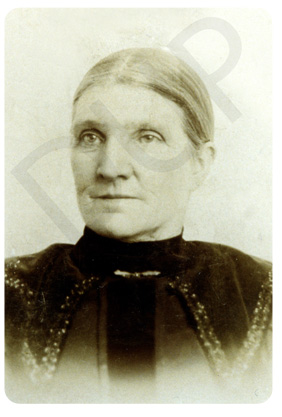Daughters of the Utah Pioneers Museum
Descriptive Detail
With head turned slightly and hair pulled back from a center part, a long, narrow pin complements the detail on the woman’s collar. The “almost smile” and brightness of her eyes suggest earlier days when she was living in St. Louis and known as Temperance Westwood. Mrs. Temperance Moon was once the nurse or nanny to the renowned nineteenth-century poet Eugene Field. The photograph and quotes are from a news interview with Mrs. Moon entitled "Nurse Who Attended Eugene Field When Boy is Now Resident of Utah." The information and photograph are made available through the courtesy of the International Society of the Daughters of Utah Pioneers Museum archives.
Needing employment
We can only imagine her as an eleven year old visiting her sister Mercy in the kitchen of the Field family home where Mercy is the cook. As they talk about Temperance’s need to find employment after their parents’ death, Mrs. Field comes in and says, “I want you to stay here” and “take care of Eugene who is getting to be such a big boy.” At age eleven and just out of childhood herself, Temperance became the nanny of a ten-month-old baby. For the next two years, from 1851 until 1853, until he was in his fourth year, Temperance assumed responsibility for Eugene’s daily care. She played with him and read stories, including Eugene’s favorite “Puss in Boots.” She also recalled that frequently Mrs. Field gave her money to buy new fairy tales. With the birth of Eugene’s brother Roswell, her role increased and the young nanny remembers sleeping in the nursery. In the interview, Mrs. Moon recalled the charming child whose father, Roswell, often came to the nursery to play with his sons. She also commented that the attorney would pace back and forth through the first floor parlors practicing a speech he was to deliver the next day. Temperance remained with Eugene, whom she describes as a “tall, slender, boyish blond” with “compliant” hair, until she left with her brother to settle in Utah.
Child labor was usual rather than the exception in the nineteenth century with more than one-third of the factory workforce between the ages of seven and twelve. It was not until towards the end of the century that laws would regulate such work. Temperance’s role as a nanny came from economic necessity. Such work was not only condoned but encouraged. “Idleness” was to be avoided.
Mormon Face Discrimination during the Early Years in America
Temperance and her family were Mormons and a part of the migration of those belonging to the Church of Jesus Christ of the Latter-day Saints—a new religious sect that began in western New York in about 1830. Founder Joseph Smith’s “Book of Mormons,” a companion to the Christian Bible, espoused divine insight and the necessity of a course-correction to prepare for the second coming. It appealed to many. With a growing number of converts in this country and in England, the movement eventually attracted the attention of those who were fearful of the Mormon’s growing economic and political power. Initial tolerance evolved into rejection, discrimination, violent confrontations, and finally eviction, as was the case in Missouri in the late 1830s. Mormons would be labeled fanatics and treasonous and then expelled from each location as they crisscrossed the Midwest first in Ohio, then near Independence, Missouri, and later the town of Nauvoo, Illinois. Finally, the Mormons settled by the Great Salt Lake in what is now the state of Utah.
top^
next artifact}
|

|




 Temperance Westwood Moon—Eugene Field’s Nanny
Temperance Westwood Moon—Eugene Field’s Nanny